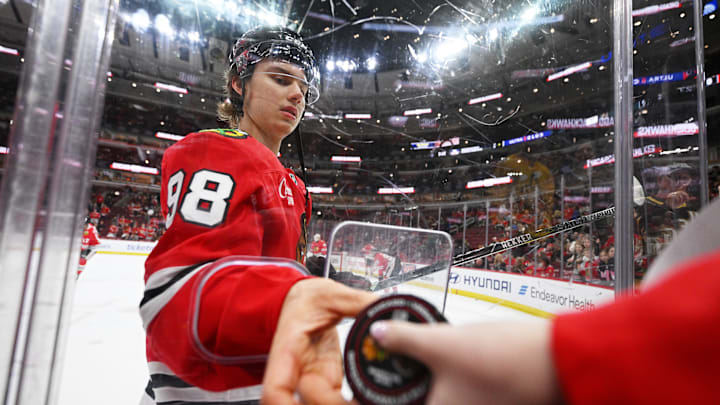Kyle Davidson has been very busy this summer locking up some of the most important young Blackhawks to extensions. The most significant of these extensions belong to Frank Nazar and Spencer Knight (sorry, Wyatt Kaiser). Looking at these two extensions, we see two different models for negotiating contracts. I believe that by understanding these two models, we can predict where Connor Bedard's contract might land and what it could cost the Hawks.
First Model: Long Term Extension (Frank Nazar)
I was thrilled when I saw that the Blackhawks locked Nazar into a contract extension this summer, but I was sent into a new dimension of ethereal happiness when I saw the details of the deal. In this deal, Davidson signed him to a long-term extension (seven years) and at a cap hit that, as the salary cap continues to rise, will be a bargain as soon as next season. This was exquisite work by Davidson, as he is betting on a player that the fanbase loves, and for good reason.
He has the potential to be a bona fide top-six center in the NHL with elite playmaking and scoring upside. And Davidson got that guy locked in at under $7 million for the next seven seasons- absolutely beautiful.
The one qualifier here is that this is the largest contract ever given to a player with as few NHL games under his belt as he does. Thus, there is logically a huge degree of risk. The obvious fear is that he does not live up to his potential, and then you are locked into a very long and expensive contract for a player who isn't worth the money. I do not believe that will be the case with Nazar, as he has already demonstrated both raw talent and tools, as well as clear improvement during his time in the NHL and at the recent IIHF World Championships, where he led Team USA in scoring.
Second Model: Short Term Deal (Spencer Knight)
This deal also makes sense for different reasons. Knight, while a very impressive and intriguing prospect, has never played a full season as a starter. In my opinion, there is more risk that he may turn out to be something less than a starter than there is that Nazar will turn out to be a bottom-six guy. Thus, the hawks paid Knight and gave him a raise as he will be making $5.83 million, up from $4.5 million. He will be serving as a full-time starter, and they want to demonstrate that they value him. Meanwhile, they only signed him to a three-year extension.
The obvious thinking from the Hawks is that we believe in this guy, but not enough to commit to an eight-year deal —at least not yet. He will have four seasons to prove that he is a starter and maybe even a star. After that, he will be eligible for a new contract and, assuming everything has gone as planned, another significant raise.
Many players these days are opting for shorter-term deals, like Knight's, in light of the rising salary cap. The reason is that the security offered by a long-term deal simply doesn't outweigh the possibility of a massive pay raise offered by a short-term deal. Almost every NHL player is going to believe in themselves and bet on themselves, and thus, signing a short-term contract, playing well, and earning a big raise seem to be the best course of action from a player's perspective. This perspective could also end up costing GMs a lot more money if the players improve as expected. Therefore, it is far more advantageous for a GM to sign a "Nazar-style" long-term deal, assuming that they really believe in that player's potential.
What Does This Mean For Connor Bedard's Next Contract?
Blackhawks fans are gonna hate me for saying this, but if I were Bedard (a lad can dream, eh?) I wouldn't sign anything more than a five-year deal. It just makes way too much financial sense for him, as a shorter-term deal would still pay him millions of dollars, but he will be eligible for a huge raise when that deal concludes, right at the beginning of his prime.
To make this point more clearly, let's do some math. Let's put two offers on the table for Bedard. The first is a $10 million, eight-year (long-term) deal, and the second is a $9 million, four-year (short-term) deal. Now, after the conclusion of the long-term agreement, he will still be in his prime at 28-29 years old and eligible for (likely) a massive pay raise. He will have made $80 million on that deal. Now, let's say that he takes the shorter deal. He would make $36 million over the course of the contract, but significantly, he will be eligible for an extension sooner, and due a massive pay raise.
Assuming Bedard becomes the game-breaker that I believe he will be, I would guess that the next contract could be something like $16 million for four years. He would make $64 million over the course of that contract, thus bringing the eight-year total to $100 million. That's an extra $20 million if he opts for two shorter deals rather than one long-term deal. In both scenarios, he will hit unrestricted free agency when he is 28-29, still in his prime, and able to demand a massive payday. However, if he takes the shorter-term deals, he will have made significantly more money.
I would much rather that the Blackhawks lock Bedard up for the long term, but I don't think that it is as likely at this point as a short-term deal would be. The important thing is that the Hawks resign him and convince him to stay here forever by building a contending team around him. That will ultimately decide both Bedard's and Kyle Davidson's future here in Chicago.
